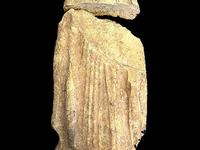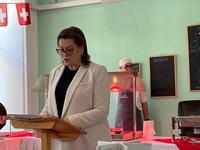Press Releases
.jpg)
04-04-2024 18:48
Address by Dr Vasiliki Kassianidou, Deputy Minister of Culture, at the 1st International Creative Event – The Cyprus Sustainable Tourism Initiative (CSTI) within the framework of the European Project “Let’s create an SDGs heritage – SDG Cultheritage”
It is an honour for me to address the 1st International Creative Event, held under the auspices of the Deputy Ministry of Culture and organised by the Cyprus Sustainable Tourism Initiative (CSTI) as part of the European Project “Let's create an SDGs heritage – SDG Cultheritage”.
It is essential to acknowledge that at the core of sustainable development lie culture and creativity. Indeed, by weaving creativity and culture into tourism initiatives, we can play a pivotal role in advancing the Sustainable Development Goals (SDGs), fostering economic growth, preserving cultural heritage and promoting environmental sustainability.
Essential collaboration between the Deputy Ministries of Tourism and Culture has led to significant synergies, especially in showcasing our cultural heritage. Our rich cultural heritage promotes Cyprus as an attractive holiday destination worldwide. However, as we advocate for culturally sensitive destinations, our commitment to sustainability remains unwavering. This commitment involves prioritising responsible behaviour and the preservation of our cultural and environmental resources, ensuring they remain intact for future generations to appreciate and enjoy.
Our commitment to preserving Cyprus' cultural and natural heritage is a cornerstone of our efforts, aligning with the principles set forth in the International Conventions of Granada and Florence. This dedication is evident in the work of the Department of Antiquities, which actively collaborates with key governmental bodies and NGOs, including the Geological Survey Department, the Department of Forests and Bird Life Cyprus. Together, we are not just guardians of our past but also architects of a sustainable future.
Our archaeological sites and monuments transcend their historical significance to become dynamic centres for education, sustainability and community engagement. In this endeavour, we emphasise:
- Transforming museums and sites into educational hubs that advocate for sustainability and green development.
- Promoting cultural tourism as an enlightened form of travel deeply rooted in environmental values and respect for local culture, thereby fostering a new type of tourist mentality.
- Utilising monuments and archaeological sites as catalysts for local community development, generating economic benefits through small-scale businesses and employment opportunities, and involving locals in the preservation and management of these sites.
By integrating these actions, we not only safeguard our cultural legacy but also utilise it as a powerful tool for promoting environmental sustainability and enhancing social cohesion. This approach underscores our commitment to sustainable, responsible tourism practices that honour and elevate our cultural heritage.
The Department of Contemporary Culture, on the other hand, is actively engaging with cutting-edge concepts and initiatives in Smart Tourism and Smart Destinations, focusing on the interplay between cultural heritage, digitalisation and sustainability. This effort aligns with the European Commission’s “Smart Tourism” framework and the United Nations World Tourism Organisation’s “Smart Destinations” initiative.
Currently, the Department is drafting a statement of principles on policies and strategies guiding the development, planning, management, operations and promotion of smart cultural tourism in Cyprus with an emphasis on contemporary culture. This initiative seeks to encourage sustainable, responsible tourism policies and actions, merging contemporary culture with innovation and cohesion.
Furthermore, the Cyprus Handicrafts Service (CHS) embodies our commitment to safeguarding traditional crafts while propelling them into the future through innovation, supporting our local artisans and craftsmen in adapting to the global market's dynamics.
Cultural tourism, by promoting interactions with local communities and supporting local artisans, offers a sustainable alternative that benefits both the environment and the economy. It involves empowering indigenous communities to share their knowledge and traditions, supporting cultural preservation and fostering cross-cultural understanding and appreciation.
All departments and services within the Deputy Ministry actively adhere to initiatives like the “ICOMOS International Charter for Cultural Heritage Tourism”, which emphasises enhancing cultural heritage protection and community resilience through sustainable tourism management. Additionally, all our efforts are directed towards ensuring that our actions align with the European Union (EU) “Transition Pathway for Tourism”.
Ladies and gentlemen,
While we have achieved notable progress in weaving sustainability into our cultural and tourism initiatives, it is evident that more efforts are needed to fully achieve our goals. The path toward sustainable development is continuous, demanding our commitment to adapt and grow.
That is why the engagement of cultural and creative organisations, like CSTI, in embracing sustainable development principles is critical as it spurs innovation and broadcasts the sustainability message in line with the EU's framework, which places sustainability at its core.
Hence, I extend my congratulations to CSTI for organising this landmark event – a crucial platform for dialogue, collaboration and the exchange of knowledge and best practices. I also commend their unwavering efforts to promote sustainable tourism practices within Cyprus and beyond.
Thank you for your attention. I look forward to the innovative ideas and discussions prompted by this event, confident in our collective ability to build a sustainable legacy for future generations – a genuine SDGs heritage.
(EFys/GS/EP)
Relevant Press Releases

22-11-2024 11:25
The “Royal Chapel” of Agia Aikaterini at Pyrga closed for the public



04-11-2024 13:18
Announcement by the Cyprus Academy of Sciences, Letters, and Arts



